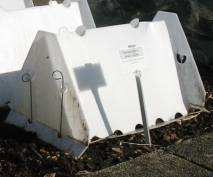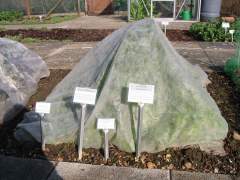Categories
Calendars
Guides
Reviews
Archive
Gallery
Articles
Ask Our Gardening Expert
Poly-Tunnels and Cloches
Poly-Tunnels and Cloches
Sowing and harvesting of vegetables can be brought forward roughly one month by using garden poly-tunnels or cloches (plastic or glass soil covers) before and after the seed sowing process. They can also be used at the end of the season to protect some low growing crops and extend the growing season. Give them a try and you will wonder how you ever did without them.
Types of Garden Poly-Tunnels / Cloche
Cloches are made of either glass or some form of plastic / polythene.
Nowadays, glass is no longer a sensible option - it is more costly than
plastic and it has the unfortunate habit of breaking, with dangerous results!
Poly-Tunnel
These are a row of hoops (wire or plastic) which support a polythene
sheet - in effect a mini greenhouse. These can be purchased at garden
centres or home made very easily and cheaply. If purchasing a poly-tunnel,
make sure that the plastic sheeting can be secured properly during windy
conditions, and that it can be raised to allow watering and ventilation.
The supporting hoops should be no more than 75cm (2� feet) apart. If spaced further apart the plastic sheeting will droop over the crops and possibly damage them especially in rain conditions.
Rigid Poly-Tunnel
There is a wide variety of rigid plastic poly-tunnels which can be
purchased at garden centres. They two key points to look for are that
they are high / wide enough for your purposes and that they can be
effectively anchored to the ground - they are easily blown by the wind,
and your neighbours will not appreciate airborne poly-tunnels.
Cloches
Cloches are just smaller poly-tunnels which are normally used to protect
a small number or individual plants.
Cloches are made from plastic or glass held together by a system of
wire, plastic or wooden supports. Plastic cloches are the most practical
because they do not break easily and are more liable to last for many
years,
In addition, plastic is much lighter then glass making it more easy to move the cloches around. The one advantage of glass is that the temperature within a glass cloche will be slightly warmer than that of a plastic cloche. But remember, a broken cloche provides no protection at all!
There are attractive bell shaped cloches available but it's just as easy to make your own out of large plastic bottles. Simply cut off the bottom of the bottle and then place it over the plant or seed to be protected. The top of the bottle cloche needs to be kept open in case the weather warms up unexpectedly. The disadvantage of bell cloches is that they cover a very small area and heat up rapidly.
Floating Cloche (Fleece)

Click here
to buy your floating fleece
Sheets of polypropylene which are placed over the seed bed - when the
seedlings emerge, the polypropylene is light enough to float up as the
plants grow. Simplicity itself, the sheet is cut to size and placed over
the bed, secured down by bricks at the edges. It's cheap, easy to put in
place and protects the seedlings from three or four degrees of frost.
Sheets of polypropylene which are placed over the seed bed - when the
seedlings emerge, the polypropylene is light enough to float up as the
plants grow. Simplicity itself, the sheet is cut to size and placed over
the bed, secured down by bricks at the edges. It's cheap, easy to put in
place and protects the seedlings from three or four degrees of frost.
Click here to buy your cloche or fleece from GardenAction's recommended online supplier.
Click on the link below to the next cloche page to learn how to best use
cloches, how to use one set of cloches on three crops in one year and
how to use cloches for specific vegetables.
Name: salih
E-mail: salih@essentialequipment.co.uk
Date posted: June 22, 2011 - 05:17 am
Message: interesting insight. without them can not do much growing during winter in this country
Name: Farah hares
E-mail: Private
Date posted: November 10, 2010 - 08:16 pm
Message: Hi there,
I planted my strawberries in my garden they grew but unfortunately insects started eating them so I potted them and I did fertilize the soil before I potted them now their dying and I don't know what to do.... Can u pleas help me!!!
Thank you,
Farah